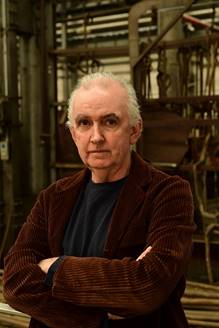STUCK IN THE MIDDLE: (RE)CONSIDERING THE MEDIOCRE IN POPULAR MUSIC

Bio
Peter Doyle is an author, academic and musician, whose books include Echo and Reverb: Fabricating Space in Popular Music Recording (Wesleyan, 2005), as well as two collections of forensic photographs, City of Shadows, 2005 and Crooks Like Us, 2009. He researches popular music histories and film sound, has curated major exhibitions on pulp publishing and forensic material cultures. He is the author of four novels, including The Big Whatever (2015). He is the recipient of two Ned Kelly Crime Fiction Awards as well as a Ned Kelly Lifetime Achievement Award. He is an Associate Professor of Media at Macquarie University, Sydney.

As always Peter, a fascinating paper. I do like the point you make about the need for a special telling in order to make a mundane life worth the read – and the other point about the difference between looking for someone remarkable that no-one else has discovered as opposed to finding the remarkable things to say about something that everyone else thinks is mundane. It reminds me of the two project you were working on when you came to the Art of Record Production conference in Cardiff – on the one hand, exalting us to write more nuanced and richly textured stories about the business people in the history of recording rather than casting them all as the wicked svengalis. And on the other hand, you were writing about those police photos from (turn of the 19th century?) Sydney as invitations to find details that hinted at the lives. I guess what that all amounts to is that I really like the way that you relate the detail of research to the need for an eye for detail in story-telling – research, an in particular historical research, is about noticing what the interesting story is based on the trail of breadcrumbs that you notice, and where it leads to…
Thanks Simon — my after-the-fact realisation is that I’m talking really about ‘life writing’ and narrative storytelling– of all the different disciplines and practices that gather together under the IASPM and general Popular Music Studies umbrella I am generally looking at writing that seeks to both create new knowledge but also entertain or divert in some way, reach outside the discipline. And I’m not at all informed about various threads in historiography and literary studies that look at the writing of small or marginal, subaltern, gendered, generally ‘othered’ lives (ie small and marginal to the big-person-in-history modes) but I gather there’s lots of scholarship around those questions. The basic principle I belabour my students (and anyone who’ll listen) with is that one needs to find something that others don’t know, about something that matters — although people might not at present think that it matters, in which case first job is convince them it does. Like confidence trickery.
Thanks, Peter. That was a really interesting paper. I wonder if there’s more to be said about the tyranny of word counts and the desire, whether scholarly or emotional, to give voice to those artists whose stories you want to tell (1000 = just right; 1500 = too much)?